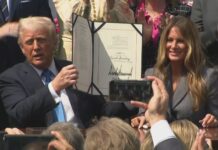
Washington, D.C. — The White House announced a major shift in trade policy on Tuesday, lifting a planned 50% tariff on Canadian steel and aluminum. The decision came after Ontario’s government reversed its plan to raise electricity costs for three American states.
Trade adviser Peter Navarro made the announcement, stressing that Canada had taken the right steps to avoid higher tariffs. However, he turned his attention to Brazil and India, accusing both countries of imposing unfair trade barriers on American goods.
“Brazil and India have tariffs above 100 percent against the US. That is not fair trade. That is taking advantage of American businesses,” Navarro said during an interview on CNBC.
The United States plans to introduce a new system on April 2 that will match tariffs imposed by other nations. Navarro confirmed that any country charging high tariffs on American products will face similar measures in return.
The stock market reacted with uncertainty following the news. The Dow Jones dropped nearly 900 points as investors feared new trade battles. Experts warned that aggressive tariff policies could raise costs for American companies relying on imports as well as causing a serious disturbance on the global level.
Canada’s Premier Doug Ford played a key role in avoiding further trade disputes. On Monday, he had announced a 25 percent tariff on electricity exports to Michigan, Minnesota, and New York.
The White House responded by planning a 50 percent tax on Canadian metals. After urgent talks, Ford pulled back on the energy tariff, leading the US to cancel its own trade penalty.
The White House remains firm on its stance against Brazil. Washington officials argue that Brazilian trade policies block American farmers and manufacturers from competing fairly. The US government is now reviewing options to pressure Brazil into lowering its import taxes.
As the April 2 deadline approaches, trade experts warn that new tariffs could spark economic disruptions. Many businesses in both the US and Brazil rely on stable trade agreements, and sudden changes could impact key industries.
Despite growing tensions, the White House insists that fair trade is the top priority. The administration plans to push ahead with tariff reviews in the coming weeks, signaling that more changes may be on the way.
















